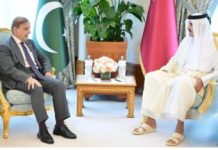Islamabad: /DNA/ – ‘Islamophobia was not a new phenomenon, it was there in the West for the last many decades, said Professor Samina Yasmeen of the University of Western Australia. ‘The term Islamophobia, however, was vague, it was only after the end of the Cold War and particularly after the rise of Daesh when Muslim educated class started becoming a part of the extremist camp, the international community began viewing Muslim migrants from an entirely different perspective that was largely biased against them, she said. ‘Muslims were increasingly labelled as conservative, non-progressive, and human rights abusers’, she added.
Professor Yasmeen was speaking at a roundtable conference on ‘Citizenship and Pakistani-Australian Women: Dealing with Islamophobia’ organized by the Institute of Regional Studies.
Earlier, Western countries were not as concerned as it was today about the Islamic way of life, she argued. Australian authorities especially were least bothered about Islamic practices unless any Muslim commits a gross human rights violations’ she maintained.
Asked about Australian people’s attitude in the wake of a terror attack that occurred in New Zealand’s Mosque that killed many Muslims, she said that ‘the kind of a moral support that Muslims received by the Australian government and the people was phenomenal’. They not only condemned those killings but were very critical too, she added.
Professor Yasmeen was of the view that generally, the behaviour of Muslims in western countries was also to blame for the negativity against Muslims. ‘The orthodox beliefs, and the culture that Muslim immigrants brought along significantly played a role in shaping up negative perceptions about them’, she said.
While discussing her research on ‘the impact of Islamophobia on Children and Women in Australia’, she said the women and children were increasingly exposed to Islamophobia wherein mothers and their children were facing challenges in social assimilation’. She hoped that her research would help reduce ambiguities associated with religion and make the world safer for all.












